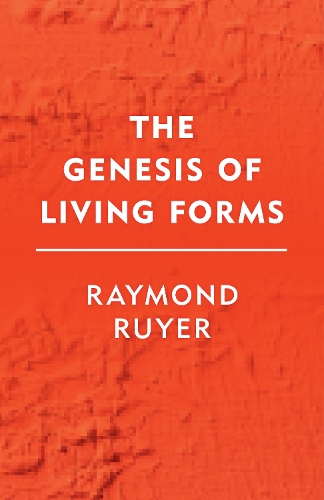
The Genesis of Living Forms
(Hardback)
Publishing Details
The Genesis of Living Forms
By (Author) Raymond Ruyer
Translated by Jon Roffe
Translated by Nicholas B. de Weydenthal
Bloomsbury Publishing PLC
Rowman & Littlefield International
18th October 2019
United Kingdom
Classifications
Professional and Scholarly
Non Fiction
Impact of science and technology on society
194
Physical Properties
Hardback
226
Width 161mm, Height 227mm, Spine 24mm
535g
Description
The philosophy of Raymond Ruyer was an important if subterranean influence on twentieth-century French thought, and explicitly engaged with by figures such as Maurice Merleau-Ponty, Georges Canguilhem, Gilbert Simondon, and Gilles Deleuze. The Genesis of Living Forms is Ruyer's most focussed and forceful analysis of a central but apparently paradoxical biological phenomenon that also presents serious problems for philosophy: embryogenesis. When a cat develops from the early stages of fertilization to an adult, what is it that makes it the same cat How is it that a living being can at once be the same and constantly changing Ruyer's answer to these questions unfolds through a detailed set of encounters with major scientific fields, from particle physics to social psychology, arguing that the paradox can only be dissolved by seeing the role that form plays in the ongoing development of living beings. In Ruyer's view, embryogenesis is a central problem not just in the life sciences; every thing must possess a relation to a form that is characteristic of it, from carbon atoms to embryos, and to embryologists themselves.
Reviews
Raymond Ruyers writings are quietly astounding provocations for a more careful understanding of morphogenesis, not only of living beings, but of the almost magical, elusive processes by which such beings form themselves. This book makes us rethink the relations between philosophy, biology, science and technology by insisting on the self-orienting forces that make and direct life. -- Elizabeth Grosz, Jean Fox O'Barr Women's Studies Professor, Duke University
At long last Ruyers essential text is available in English. Thanks to Roffe and de Weydenthals graceful and reliable translation, Anglophone readers will now know why Deleuze and many other French thinkers have found Ruyer such an innovative and provocative figure in the philosophy of biology. -- Ronald Bogue, Professor Emeritus of Comparative Literature, University of Georgia
It is because Ruyer understands machines very well that he is able to clarify the confusion often arising between machines and life forms. His critique of misplaced vitalism is as perceptive as that of misplaced mechanism. This is why his philosophy of biology is becoming even more relevant today when we have to understand Earth as an entanglement of life forms and machines. -- Bruno Latour, Professor Emeritus, Sciences Po
Author Bio
Raymond Ruyer (1902-1987) was an influential philosopher of science and Professor of Philosophy at the Universite de Nancy. Jon Roffe is Vice-Chancellors Postdoctoral Fellow at the University of New South Wales, and a founding editor of Parrhesia: A Journal of Critical Philosophy. The co-editor of a number of volumes on twentieth-century French philosophy, he is the author of Badious Deleuze (2012), Abstract Market Theory (forthcoming), Gilles Deleuzes Empiricism and Subjectivity (forthcoming), and the co-author of Lacan Deleuze Badiou (2014, with AJ Bartlett and Justin Clemens). Nicholas B. de Weydenthal is a doctoral candidate based in the School of Historical and Philosophical Studies and the Department of Management and Marketing at the University of Melbourne.
